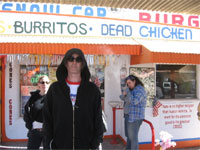|
Clover, Joshua
|
|
February 11th, 2007 under Faculty
|
Associate Professor, English Department, UC Davis; Affiliated member of the UC Davis Critical Theory and Film Studies Programs
Home page
 Joshua Clover is an Associate Professor of English Literature at University of California Davis, affiliated with Critical Theory and Film Studies. His most recent book of poetry,The Totality for Kids, was named on of the Village Voice’s top 25 books of 2006; his previous, Madonna anno domini, won the Walt Whitman Award from the Academy of American Poets. He has published a volume on The Matrix for the British Film Institute’s Modern Classics series, considering its function as an allegory of political economy for the millennial information worker. He is co-founder of the 21st Century Poetics talk series (“C21P”) at Berkeley; founding member of the Technoscience, Culture and the Arts research cluster at UC Davis; and contributes to the New York Times. Recent presented work includes an essay on the episteme of “the real” and mobility in relation to file sharing; and various projects related to “weltsystemaffekt,” the vanishing affect of one’s participation in world systems. In 2007, he co-curated the conference on the Extreme Contemporary for Stanford’s Center for the Study of the Novel. Joshua Clover is an Associate Professor of English Literature at University of California Davis, affiliated with Critical Theory and Film Studies. His most recent book of poetry,The Totality for Kids, was named on of the Village Voice’s top 25 books of 2006; his previous, Madonna anno domini, won the Walt Whitman Award from the Academy of American Poets. He has published a volume on The Matrix for the British Film Institute’s Modern Classics series, considering its function as an allegory of political economy for the millennial information worker. He is co-founder of the 21st Century Poetics talk series (“C21P”) at Berkeley; founding member of the Technoscience, Culture and the Arts research cluster at UC Davis; and contributes to the New York Times. Recent presented work includes an essay on the episteme of “the real” and mobility in relation to file sharing; and various projects related to “weltsystemaffekt,” the vanishing affect of one’s participation in world systems. In 2007, he co-curated the conference on the Extreme Contemporary for Stanford’s Center for the Study of the Novel.
Links: Joshua Clover’s faculty page| jane dark’s sugarhigh!
Quote:
I’m not persuaded that information or capital, and these two things see each other when they look in the mirror, routes around us; it just feels that way. All day long, it passes through those of us in the abstract class (and this may be what’s meant by the content-free term “middle class”; no wonder it promises its own universality). It is more or less what we do all the time, while we are doing other things, “While someone else is eating or opening a window or just walking dully along.” This is the truth of globalization, or of our participation in the world-system. And yet we have little experience of it, of the feeling-which-is-not-one of being a node in the great circulation. This is the fact which I take to be at the missing heart of late modernity: a degree of abstraction so great that, among other things, the abstract becomes representational.
— from “Stock Footage, or Representability of World Systems,” Paper presented at the conference on The Extreme Contemporary, 12 January 2007.
|
|
|
|
|